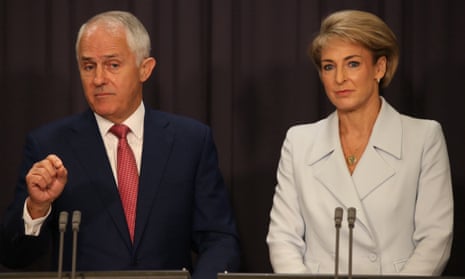Making or receiving payments that encourage unions to improperly trade off workers’ rights will be criminalised under a plan unveiled by the federal government.
Malcolm Turnbull and the employment minister, Michaelia Cash, announced the policy on Monday in Canberra, arguing it was necessary to ensure unions put members’ interests first.
Under the proposal payments made with a “corrupting motive or intent” of inducing unionists to act improperly will be punishable by up to 10 years in prison, up to a $900,000 fine for an individual or $4.5m for a company.
Turnbull said that any payment made from an employer “other than for a clearly legitimate purpose, such as payment of union dues” will be punishable by up to two years in prison, or up to a $90,000 fine for an individual or $450,000 for a company.
Both measures will apply to both employers who make the payments and unions who solicit or receive them.
Legislation to be introduced on Wednesday will also require unions to disclose payments made by employers at the time a workplace deal is put up for vote.
The plan implements several key recommendations of the Heydon royal commission into trade unions, which Cash promised to adopt weeks before the 2016 election.
Cash said the new criminal offences would not apply to payments for “genuine services” provided by unions to employers, such as a safety training programs, but unions would have to show the service was provided at market rates.
Turnbull said the new law was needed because “Australians were horrified to see the extent of secret payments made by employers – big business very often – to trade unions, particularly the Australian Workers Union”.
He cited AWU agreements with Cleanevent and Chiquita Mushrooms that traded off entitlements, including penalty rates.
In the case of Cleanevent, commissioner Dyson Heydon found that in 2010 the company paid the AWU Victorian branch $25,000 a year and provided a list of employees to be signed up as members in return for the union maintaining an expired Work Choices agreement that removed penalty rates.
The former AWU Victorian secretary Cesar Melhem was referred to Victorian police and prosecutors for consideration of whether such conduct amounted to the union receiving corrupt commissions. Melhem has denied wrongdoing.
In June 2015, the new AWU Victorian secretary, Ben Davis, disavowed the practice in evidence to the royal commission.
Then AWU national secretary, Scott McDine, said the union took the matter “extremely seriously” and praised Davis’s “principled and diligent [efforts] ... to ensure any practices that are not aligned with member interests are identified and discarded”.
Cash insisted that the new laws would reflect the fact that “it takes two to tango” and employers would also be held accountable for payments made to unions.
Asked about laws that already prohibit corrupt commissions, Cash said the changes were need because the royal commission had found there were “different laws in relation to bribery ... there is no consistency and it is difficult to prove”.
She said when Heydon had made the recommendation employers supported it.
When asked why employer payments to unions would be criminalised but corporate donations to political parties are presumed not to corrupt public policy, Turnbull mischaracterised the question as amounting to “defending employers paying bribes to unions”.
Turnbull said that, if Bill Shorten were “fair dinkum” about restoring the union movement’s credibility, he would back the legislation.
The Greens industrial relations spokesman, Adam Bandt, told Guardian Australia his party would look at the bill when it was introduced.
“But if this is trying to stop the exploitation of low paid workers in industries like fast food – this won’t do it,” he said.
“It doesn’t put one single dollar in the pocket of a McDonald’s worker earning $18 an hour flipping burgers.”
On Monday, senator Nick Xenophon said the proposed legislation sounded “interesting” but questioned how it would be policed and what the burden of proof would be.
Xenophon said the government should consider criminal penalties for directors of companies who repeatedly committed offences such as underpayment of workers.
At the start of this month the government introduced legislation to implement its promise to increase fines and create a new offence for franchisors who fail to stop underpayments by franchisees.
